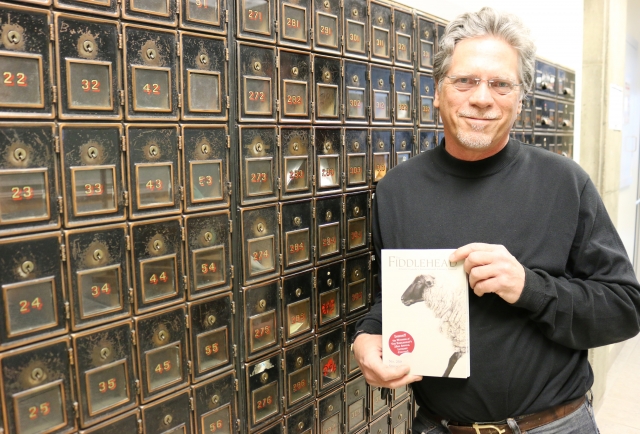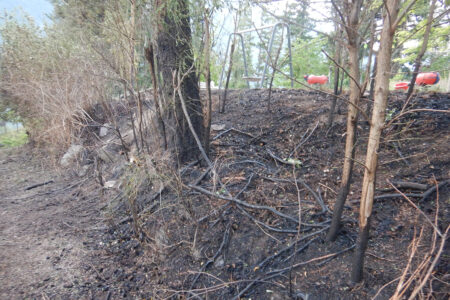Selkirk College English Instructor Wins Prestigious Award
Myler Wilkinson’s deep connection with one of the greatest short story writers in history has earned recognition and praise from a distinguished Canadian literary journal.
In the Spring, 2014 edition of The Fiddlehead, the Selkirk College instructor was named the winner of the journal’s 23rd Annual Literary Contest for Best Short Fiction. Wilkinson’s winning short story—The Blood of Slaves—is based on the life of famed Russian writer Anton Chekhov.
“I sent it to the journal without any real feeling that I would win anything at all,” says Wilkinson. “I knew it was a good story and well written, but I didn’t expect to win.”
The Fiddleheadis Canada’s longest living literary journal and is published four times a year at the University of New Brunswick (UNB). First published in 1945, The Fiddlehead is known as the who’s who of Canadian literature. Out of the dozens of shortlisted stories submitted for the annual award, UNB writer-in-residence Douglas Glover chose Wilkinson’s entry as the best of the best.
“The idea of writing a story about a Russian writer who died in 1904 and all of the things that made him Russian and important as a writer in the world, is not necessarily a topic that you would think would be immediately interesting to Canadian readers,” says Wilkinson. “I’m so very pleased that he [Glover] saw enough that he put me at the top of quite distinguished list of writers. He saw something there and that means a lot in and of itself. Writing across cultures has become a more important thing these days.”
A Career Spent Exploring Russian Culture
The seeds for The Blood of Slaves were planted many years ago. Wilkinson arrived at Selkirk College to teach English more than 25 years ago where he continued to strengthen his bonds with Russian culture. He has visited many times where he has taught at the prestigious Moscow State University.
“My fascination with Russia goes back many, many years and includes long stints living and teaching there,” he says. “There is a pretty rich 30 years of connections with Russia and Russian culture.
“Often I would get blown away by how excessive the culture can be in various ways, I felt I always had a place go to which is Russian artists and Russian culture. To go back to place that was not problematic to me and instead a beautiful world.”
Anton Chekhov has always fascinated Wilkinson. The Blood of Slaves derives from one of the Russian writer’s most famous letters to his friend Aleksey Suvorin in 1889. In that letter Chekhov wrote of squeezing the blood of slaves from his body. The story emerged out of Wilkinson’s desire to recapture the voice of Chekhov.
“Whatever knowledge I had seemed to come out of me in an organic way,” Wilkinson says about the short story. “Not in an easy way, but the research had become imbedded in me as knowledge or feelings about the writer. It was a wonderful thing to balance artistic inspiration with the myriad of details you know about this important figure. I sometimes call it micro-history, that desire to go in between the cracks of history and try to understand what you can never know in a person’s life.”
The Blood of Slavesallowed Wilkinson to build on his connection with Chekhov and the Russian culture.
“Historical fiction has become more and more important in the last 20 years,” he says. “In various ways, writers are trying to think of a real person in history and imagine the parts you will never know. That genre has become more obvious in the last 20 years. In this confusing age, perhaps the linkage between history and literature has become a much more visibly interesting topic… where the real and imagined are joined and you can’t absolutely distinguish them from one another.”
Inspiration to Create Comes in Different Forms
The Fiddleheadaward is just one highlight of Wilkinson’s impressive career in both literature and education. He has published several books and had many articles featured in journals across North America.
His first major recognition came early in his career when he won an award in Prism International, the oldest literary magazine in Western Canada which is published by the Creative Writing Program of the University of British Columbia. For Prism International’s 25th anniversary anthology, Wilkinson’s short story was included amongst Canadian greats like Margaret Laurence, Al Purdy and Alden Nowlan.
Now 61, Wilkinson is nearing the end of his teaching career and says getting a nod for his work comes at a special time.
“Prizes are always given a year or two after you have written a story, so in some ways this is already in the past,” he says. “It’s not any guarantee of the future, but it reminds you that the writing you have done that was important to you, was valued by people along the way. It provides that little bit of impetus to do a little bit more.”
The Blood of Slavesis dedicated to Alexander Vaschenko, the Russian scholar, writer and artist who Wilkinson says made his deep connection to Russia possible. Over the years Vaschenko visited the Kootenays where he gave guest lectures. Vaschenko passed away this winter and Wilkinson is traveling to Russia in the summer for his memorial service.
Wilkinson was instrumental in the creation of the Mir Centre for Peace on the Castlegar Campus. He continues to teach English Literature and in the Peace Studies Program at Selkirk College.






















